

A New Earth - Eckhart Tolle - Class No. 1 of 10. Eckhart Tolle, Where He Went Wrong. We’ve spent recent time reviewing Eckhart Tolle’s book “A New Earth.”
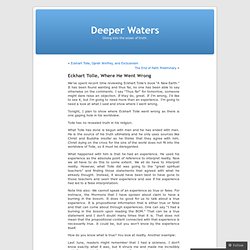
It has been found wanting and thus far, no one has been able to say otherwise on the comments. I say “Thus far” for tomorrow, someone might dare raise an objection. If they do, great. Eckhart Tolle, Oprah Winfrey, and Exclusivism. Oprah Winfrey has asked how can there possibly be one way to God?
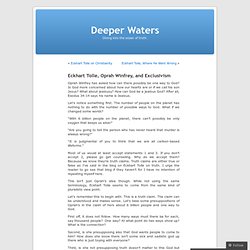
Is God more concerned about how our hearts are or if we call his son Jesus? What about jealousy? How can God be a jealous God? After all, Exodus 34:14 says his name is Jealous. Eckhart Tolle on Christianity. Tonight, we’re going to look at what Eckhart Tolle has to say about Christianity in history and in the present.
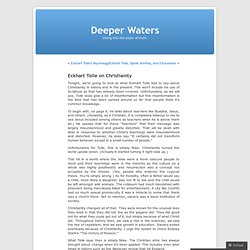
This won’t include his use of Scripture as that has already been covered. Unfortunately, as we will see, Tolle does give a lot of misinformation but this misinformation is the kind that has been spread around so far that people think it’s common knowledge. To begin with, on page 6, he talks about teachers like Buddha, Jesus, and others. (Honestly, as a Christian, it is completely hideous to me to see Jesus included among others as teachers when he is above them all.) Eckhart Tolle’s Psychology. Today, we’re going to look at the psychology presented in “A New Earth.”
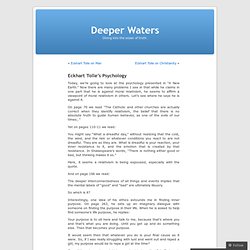
Now there are many problems I see in that while he claims in one part that he is against moral relativism, he seems to affirm a viewpoint of moral relativism in others. Let’s see where he says he is against it. On page 70 we read “The Catholic and other churches are actually correct when they identify relativism, the belief that there is no absolute truth to guide human behavior, as one of the evils of our times;.” Yet on pages 110-11 we read: You might say “What a dreadful day,” without realizing that the cold, the wind, and the rain or whatever conditions you react to are not dreadful. Here, it seems a relativism is being espoused, especially with the quote.
And on page 196 we read: The deeper interconnectedness of all things and events implies that the mental labels of “good” and “bad” are ultimately illsuory. Eckhart Tolle on Man. I said last night’s blog would be shorter as when dealing with a pantheistic notion of the universe, you can’t say much about God that isn’t said about the world.
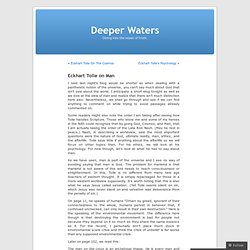
I anticipate a short blog tonight as well as we look at the view of man and realize that there isn’t much distinction here also. Nevertheless, we shall go through and see if we can find anything to comment on while trying to avoid passages already commented on. Some readers might also note the order I am taking after seeing how Tolle handles Scripture. Those who know me and some of my heroes in the faith could recognize that by going God, Cosmos, and Man, that I am actually taking the order of the Late Ron Nash. (May he rest in peace.) As we have seen, man is part of the universe and I see no way of avoiding saying that man is God. On page 11, he speaks of humans “Driven by greed, ignorant of their connectedness to the whole, humans persist in behavior that, if continued unchecked, can only result in their own destruction.” Eckhart Tolle On The Cosmos. This blog will probably be shorter than last night’s.
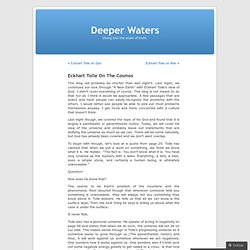
Last night, we continued our look through “A New Earth” with Eckhart Tolle’s view of God. I didn’t cover everything of course. This blog is not meant to do that nor do I think it would be appropriate. A few passages that are select and most people can easily recognize the problems with the others. I would rather see people be able to pick out most problems themselves anyway. Last night though, we covered the topic of his God and found that it is largely a pantheistic or panentheistic notion. To begin with though, let’s look at a quote from page 25. Question!
Eckhart Tolle on God. We’ve been reviewing Eckhart Tolle’s book “A New Earth” here at Deeper Waters.
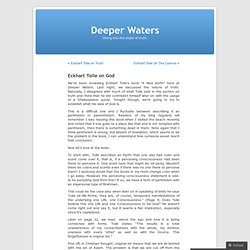
Last night, we discussed the nature of truth. Naturally, I disagreed with much of what Tolle said in the section on truth and think that he did contradict himself later on with the usage of a Shakespeare quote. Tonight though, we’re going to try to establish what his view of God is. This is a difficult one and I fluctuate between describing it as pantheism or panentheism. Readers of my blog regularly will remember I was reading this book when I visited the beach recently and noted that if one goes to a place like that and is not tempted with pantheism, then there is something dead in them.
Now let’s look at the texts. To start with, Tolle describes an Earth that one day had color and scent come over it, that is, if a perceiving consciousness had been there to perceive it. Later on page 22, we read about the ego and how it is being connected with forms. Friends. Eckhart Tolle on Truth. There is only one section alone that I really want to focus on in “A New Earth” as the book is divided into chapters and each chapter is divided into sections.
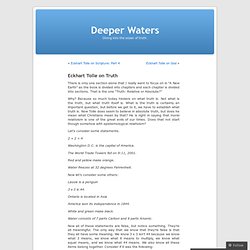
That is the one “Truth: Relative or Absolute?” Why? Because so much today hinders on what truth is. Not what is the truth, but what truth itself is. What is the truth is certainly an important question, but before we get to it, we have to establish what truth is. Let’s consider some statements. Washington D.C. is the capital of America. The World Trade Towers fell on 9-11, 2001. Red and yellow make orange. Water freezes at 32 degrees Fahrenheit. Eckhart Tolle on Scripture: Part 4.
Hopefully, we’ll wrap up Tolle’s use of Scripture this time.
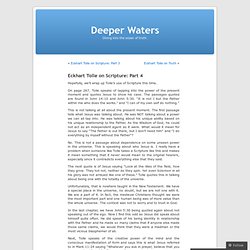
On page 267, Tolle speaks of tapping into the power of the present moment and quotes Jesus to show his case. The passages quoted are found in John 14:10 and John 5:30. “It is not I but the Father within me who does the works.” and “I can of my own self do nothing.” This is not talking at all about the present moment. The first passage tells what Jesus was talking about.
No. The next quote is of Jesus saying “Look at the lilies of the field, how they grow. Unfortunately, that is nowhere taught in the New Testament. In the last chapter, we have John 5:30 being quoted again about not speaking out of the ego. Next, Tolle speaks of the creative power of the mind and the conscious manifestation of form and says this is what Jesus referred to in Mark 11:24 saying “Whatever you ask in prayer, believe that you have received it and it will be yours.” The last then is Matthew 5:5 saying the meek will inherit the Earth. No. Eckhart Tolle on Scripture: Part 3. We’ve been going through Eckhart Tolle’s book “A New Earth” and looking at first, his use of Scripture.
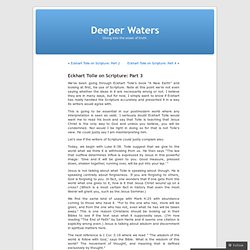
Note at this point we’re not even saying whether the ideas in it are necessarily wrong or not. I believe they are in many ways, but for now, I simply want to know if Eckhart has really handled the Scripture accurately and presented it in a way its writers would agree with. Eckhart Tolle on Scripture: Part 2. I have been asked to continue my blog at another site. I simply must decline though as this is my blog and my readers expect it and it’s a good resource for me to easily point back to whenever I need to share some thoughts on a subject and I remember that I’ve done a blog on the topic.
Eckhart Tolle On Scripture: Part 1. I recently read Eckhart Tolle’s “A New Earth” as I believe I mentioned in an earlier thread describing a vacation to the beach. It’d be very tedious to go through this chapter by chapter as each chapter has numerous subsections and most of it is psychology. We will discuss that aspect in another thread. For today, I’d like to discuss his use of Scripture. For those interested, I am using the First Plume printing edition from September of 2006.
On page 23, we read the following in regards to Isaiah 65:17 and Revelation 21:1 talking of a New Earth. “We need to understand here that heaven is not a location but refers to the inner realm of consciousness. Later that same page we read “A new heaven is the emergence of a transformed state of human consciousness, and a new earth is its reflection in the physical realm.” Geez.